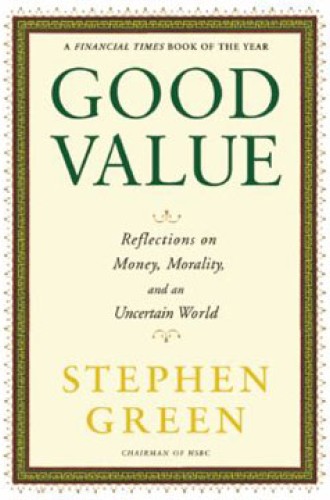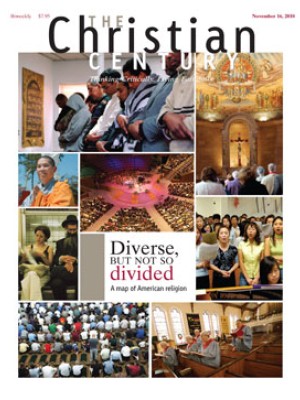A review of Good Value
Stephen Green would be the first to tell you that he has led a
privileged life. Indeed, he acknowledges his privilege throughout his
book. As chair of HSBC, the global banking powerhouse, he has traveled
the world and has engaged deeply in the global economy. He has sipped
champagne and exchanged ideas at retreats with the world's most powerful
people.
Most readers and potential readers of Good Value are also
privileged. First off, nearly anyone who would pick up Green's book—or
read this magazine—is economically advantaged, at least from a global
perspective. Second, we are privileged to read a book in which an author
ably weaves self-reflection into his analysis of the global market
without making it a treatise on himself. Seen in its best light, Good
Value is about the opportunities and the responsibilities that readers
have to shape a more humane economy and, in so doing, to live better
lives.
Read our latest issue or browse back issues.
Green curiously states that his book is not about economics or
policy, but about the larger questions people ask about meaning and
well-being. In reality, Good Value is about all of these things. It is
an inviting though sometimes meandering narrative of current realities
and great ideas from past and present. Green offers his own account of
the history of markets and—even more sweepingly—of international
relations. He seeks to relativize the current economic crisis by placing
it within a history that ebbs and flows. Prosperity and power alike
are temporary realities, and they do not deliver the well-being that
they promise. Both nations and individuals, Green says, would do well to
remember how fleeting success is. He expresses appreciation for the
wisdom of Ecclesiastes: all is vanity, and toil and the pursuit of
earthly gain seldom bear the fruit that the pursuer had expected.
The
book's signature chapter is the penultimate one, "Faust and the Rich
Young Man." Here Green poses fundamental questions about an individual's
appropriate place within a complex and morally ambiguous global
economy. Is it possible to hold a position of influence in the
marketplace, or even to participate in it at all, without losing your
soul? The chapter is deeply informed by Green's twin vocational
identities: banking executive and Anglican priest. In accessible, candid
prose, he captures the existential struggle that protagonists from
biblical times to the present—the rich young ruler, Macbeth, Faust and
others—have faced as they have sought material goods, political
influence and other earthly pleasures. As Green vividly recounts, those
quests have mixed results.
In earlier chapters Green decries the
detrimental effects of corporate corruption, inequality and
environmental degradation on human beings. The book is most compelling
when he focuses on the destructive impact that economic ambition and
workaholism can have on workers and their loved ones. It is on this
point that the author, as a high-octane executive, has a unique voice.
Green
counsels his readers to beware of the siren song of financial success.
But he also rejects a leave-the-market approach, which he says can work
for only the pampered few. He calls us instead to transform our
creative energies into a higher form of ambition--what he calls an
"ambition to contribute."
Humans are hard-wired, Green claims, to
engage in market activity. He believes that the human "propensity to
venture and trade" makes capitalism the default economic system—the one
that "emerges when other 'isms' aren't imposed." He later prudently
moderates his tendency to view capitalism as natural or inevitable by
posing questions about what kind of capitalism we should pursue. More
important, Green helpfully asks readers to consider what goods will
truly contribute to their happiness. Money, he says, cannot be the
be-all and end-all of a satisfying life. With less empirical certainty
than he expresses toward the human impulse to exchange, he asserts that
we find ultimate satisfaction only when we are giving back to the human
community that has helped us become who we are.
Readers will surely
want to consider the criticism that it is easy for the chair of the
world's largest bank to say that money doesn't buy happiness and that it
is rewarding to give back even in amounts surpassing the biblical
minimum of 10 percent. I admit that when I read executives' calls for
servant leadership—language that Green uses only in one section—I
wonder if they are suggesting that the servant leader should not be so
ostentatious as to drive a Mercedes but should settle for a BMW.
A
generous reading of Green has him saying much more than that. His call
to find innovative and generous ways to address the scourge of global
poverty is an indelible part of his narrative. Yet he is intentional in
not dictating exactly what any particular reader should do. It all
depends on readers' particular gifts and talents and on the specific
needs and contexts in which they find themselves. It also depends, Green
states clearly, on each person's metaphysical prism, theological
worldview or moral commitments. For his part, Green embraces his
Christian identity, though he declines to reveal his own credo or set of
theological convictions.
Given all of his worldly success, Stephen
Green must be a practical man. But his winding chapters and measured
conclusions may frustrate readers who are looking for easy answers. In
my judgment, the book will be received by businesspersons as a gift—a
set of reflections that give overworked, anxious leaders the permission,
as well as the intellectual resources, to ask some of the bigger
questions about their work and their wider lives.







